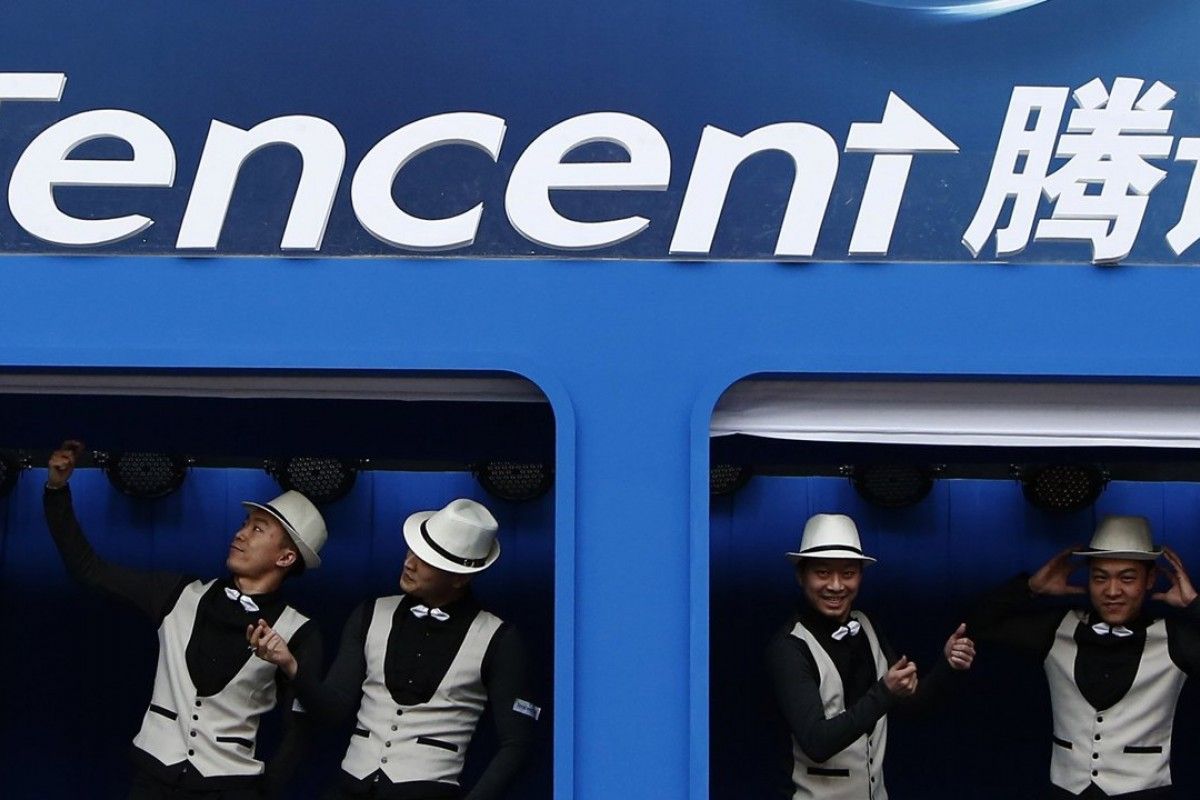After ByteDance, China’s Tencent could be Trump’s next target for attack

A few minutes every morning is all you need.
Stay up to date on the world's Headlines and Human Stories. It's fun, it's factual, it's fluff-free.
A simple threat of banning the operations of Chinese tech giant Tencent in the US, as has seemingly worked with TikTok, would appear to be insufficient this time round.
The Trump administration has continued to escalate its war against Chinese-owned companies operating in the United States and signs suggest that this conflict may be far from over.
Having recently secured the sale of Chinese-owned social media platform TikTok’s operations in the US and elsewhere, according to reports, the Trump administration is weighing up new targets for attack.
Tencent Holdings Ltd., one of China’s largest companies with a massive market cap of over US$500 billion, appears high on that list. Letters have already been sent by the Committee on Foreign Investment in the US (Cfius) to companies partnered with and invested in by Tencent, allegedly inquiring as to concerns over Americans’ personal data.
But this attack may prove more difficult for the US government. Tencent is considerably larger than ByteDance Ltd., the TikTok owner, and with billions of dollars worth of investments spread throughout a wide variety of American companies, it may be even harder to dislodge Tencent from operating in the US.
A simple threat of banning the operations of Chinese tech giant Tencent in the US, as has seemingly worked with TikTok, would appear to be insufficient this time round.
Trump’s targets
The Trump administration’s targeting of Chinese-owned companies operating in the US is not a new phenomenon but it’s one that has been drastically ramped up recently.
In May 2019, Huawei Technologies Co Ltd., the Chinese telecoms giant, was placed on the US Treasury Department’s “Entity List,” forbidding US firms from trading with the company without an explicit license.
These restrictions were extended into 2021, with Huawei facing considerable pressure to secure crucial semiconductor components before trading bans came into force. The Chinese telecoms giant also faces being frozen out of numerous world markets, including the world’s second-largest smartphone market – India.
However, Huawei has not suffered alone.
In August, President Donald Trump signed a series of Executive Orders banning US residents and companies from dealing with Chinese companies ByteDance and Tencent. The president argued that the US “must take aggressive action against the owners of TikTok to protect our national security.”
American parties were told to sever ties with the companies, with ByteDance’s TikTok subject to a well-reported ban should no American buyer be found for its operations.
It appears now that a buyer has been found, with Larry Ellison’s Oracle Corp. reportedly winning the bidding process to secure TikTok’s US operations, after Microsoft’s offer, previously in the lead for the acquisition, was rejected.
Tencent under fire
With the TikTok deal seemingly wrapped up, attention has now turned to Tencent, one of China’s biggest companies and one with a significantly larger presence abroad than ByteDance, especially in the US.
Tencent was already subject to US restrictions imposed by President Donald Trump in August, which targeted ByteDance’s TikTok and Tencent’s WeChat, but signs suggest that an escalation of these attacks may be forthcoming.
Reports have suggested that the Committee on Foreign Investment in the US, which is chaired by the US Treasury Department, has sent letters to a number of American companies with links to Tencent – whether they are owned by the Chinese company or simply have investments in it – inquiring about security protocols in the use and handling of the personal data of American users.
Those American companies contacted include Epic Games, Inc. and Riot Games, two American-based video game companies. Tencent paid US$400 million for a 93% stake in Riot Games, the developer behind the popular online game “League of Legends” and also bought a 40% stake in Epic in 2012.
Cfius has been empowered by a 2018 law that allows the committee further powers to investigate transactions, including minority investments as in Epic’s case, that were not publicly disclosed and reviewed by the panel.
This can include retroactive investigations over historic transactions, so long as the committee is presented with concerns over corporate governance, access and use of personal data, and other criteria.
Alongside a reported Cfius investigation, the Trump administration has attempted to push forward with attempts to ban WeChat, the Tencent-owned multi-feature app with over one billion global users, citing similar national security concerns it raised when threatening TikTok’s ban.
WeChat is an app-of-all-trades. It allows users to message one another, share news, pay bills and more, all within one platform. It is also a hugely important tool in the daily lives of the global Chinese diaspora, with the app being crucial in connecting loved ones across the world, with an estimated 1.2 billion monthly active users worldwide and some 19 million daily active users in the US alone.
Yet concerns have been raised about WeChat’s connections to China’s national security apparatus, with some claiming that the app is used by China’s authorities to surveil its citizens and even its diaspora outside the country. It’s also been claimed that news and information that travels on the app is closely watched over and regulated by the state.
Unlike TikTok, which is separated from its Chinese-cousin Douyin for global audiences, WeChat is integrated with Chinese servers. According to The New York Times, WeChat thus remains “a single, unified social network spanning China’s Great Firewall.”
The US Commerce Department announced a new order to block people in the US from downloading both TikTok and WeChat from September 20 onward.
A California judge temporarily blocked the ban, however, with a group of WeChat users, calling themselves the WeChat Alliance, succeeding – for now – in their lawsuit arguing that the ban violated the due process of users and their free speech rights.
Despite the temporary injunction, the US government remains committed to ceasing WeChat’s operations. The US Department of Justice has reportedly sought an immediate ban on the app while lawsuits over the first ban attempt remain in the courts.
This is not the first time Tencent’s operations in foreign countries have come under fire. In June, WeChat, alongside other Chinese-owned apps, was banned by India’s Ministry of Electronics and Information Technology following border tensions between the two countries. Tencent’s video streaming services also face a potential ban in Taiwan.
The giant of Tencent
Any attack against Tencent and its products, however, is unlikely to progress along similar lines as TikTok’s ban.
Over the past five years, Tencent has been involved in more than 40 US transactions with a total value of more than US$16 billion, according to analysts Dealogic.
A small sample of Tencent’s biggest US and international investments includes a whole host of companies and industries, revealing immediately the difficulty in dislodging the company from operations in the US with one swift blow.
Tencent owns a 5% stake in Elon Musk’s Tesla, Inc. and owns minority stakes in video game companies Activision Blizzard, Inc. and Epic Games. The Chinese giant has also invested in Snap Inc. and owns Los Angeles-based game developer Riot Games outright, the company behind the popular online game “League of Legends.”
In total, Tencent has some 300 investments in its portfolio, according to PC Gamer.
Bloomberg Intelligence analysts Vey-Sern ling and Tiffany Tam have estimated that Tencent’s US assets could be worth at least US$22 billion, accounting for around 6-7% of the Chinese company’s sales and profits.
Though the Trump administration’s attack against ByteDance and TikTok seems to have resulted in a deal, proceedings for TikTok’s US divestment were notoriously complex, owing to certain technical components of the deal as well as political interventions from both President Donald Trump personally and the Chinese government which sought to stall any deal.
It is unlikely that any attempt to turn attention toward Tencent and force divestment of its US operations, as has already been signaled by the Committee on Foreign Investment in the US, would be any more straightforward.
Have a tip or story? Get in touch with our reporters at tips@themilsource.com




Comments ()